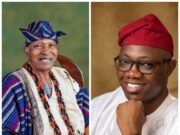Unless we understand the sociology of interconnected livelihoods, we cannot understand the turn of event as the worst hit class react to the strains of COVID-19 through violent criminality and deviance to the lawful orders. As the reining undisputed heavyweight poverty capital of the World, Nigeria(ns) cannot afford not to embark on everyday Diaspora struggles for a functional living. As the breadwinner lives home daily, the growing population of dependants, both within his/her immediate household and in extended network of relations pray for a fruitful return. It is in this everyday struggle that the survival of the commercial Danfo drivers and conductors rely on the workers, market people and commuters who board their vehicles. The filling stations earn their daily livelihoods from economically active and migrant vehicles. The fuel attendants will only earn wages if they open for business. The extortion-economy of street urchins, also known as area boys and the bad eggs in police are tied to a functionally active roads occupied by different road users from which they draw their victims every day. What about the one-chance robbery gang? They are out of job since those who would have fallen victims of their antics have been instructed to stay at home. Let us not forget the child breadwinners who rely on their youthful strength to sell goods in traffic. Now that the roads are deserted, what will they eat along with their families who depend on their economic contributions? By the road sides are ice-cream vendors, pure water merchants, truck pushers, luggage porters among others. They depend on people to be on the roads to earn a living. The burgeoning inter-state transport system across the country is feeling the heat of COVID-19 with the total lockdown imposed on the Lagos Megacity, Abuja and Ogun State. The many strains that COVID-19 imposed on everyday survival of the poor is the sociology of interconnected livelihoods. This ultimately gives birth to Nigerias enugbe economy.
Enúgbe describes an unpalatable state of deepened hopelessness and uncertainty to nourish ones stomach infrastructure. Enugbe unpacks the complex state of scarcity and economic dryness which denies the mouth of moisturising contents. The poor and other vulnerable groups domiciled in the enugbe economy. On the flip side is enurínrin (the wet mouth). It literally represents a person who has eaten with groundnut oil surrounding the mouth region. In the present socio-economic quagmire, only the rich enjoy this enurinrin economy.
Nigerian hip hop artiste, Olamide Adedeji also known as Olamide Badoo, summarises the hardship in the country in his song, Oil and Gas.
Deriving inspiration from the streets, Olamide noted the unfriendliness of the street (Igboro o rerin) in relation to the strain, lack and inability for people to actualise their needs in our Enúgbe economy. Olamides lyrical constructs lay bare the helpless situations that confront people living in Nigeria and the difficulties encountered in seeking help when they experience the enugbe syndrome. The insolvent Nigerians that are asked to stay at home seek help from friends and families but since they are almost at the same level of survival to offer any assistance, their woes are compounded. But you still have to try your luck hence, Badoo, says oga mi enugbe, alayeenugbe, walahi enugbe (My boss I am broke, My guy I am broke. God sees me, I am broke). The rising cases burglary, robbery, kidnapping, looting and violent attacks by hoodlums in some communities around the country attest to the loopholes in federal and state governments social welfare interventions.
We now have the newly vulnerable yet to be targeted and captured. Unless this is done, fighting COVID-19 in an Enúgbe economy may spell further doom.
The social reality in Nigeria occasioned by the official steps to contain the spread of COVID-19 is restriction on human movement and trades within states (except food and medicine). The experiences differ depending on whether you are located in partially or totally lockdown states. As it is playing out, staying at home with limited resources to cope with everyday needs is moving the vulnerable from lockdown to knockdown. While State Governors will pay civil servants asked to stay at home, who will pay pastors and Imams, event managers, beggars and journalists that COVID-19 has knocked down their economies? Who will attend to the dependants these people now that their breadwinners economy has entered enugbe?
Interestingly, in this same economy, there are the people who are not experiencing drought all season. This group are in the enuririn economy. They are politicians, business moguls, and contractors. The enugbe economy does not affect the rich and influential class who imported COVID-19 into the country before the poor are made to pay for their sins. Olamide seems to understand this dynamics that no private school will pay their teachers while on compulsory stay at home. Now at home, who will they look up to?
To Olamide, Africas Richest man, Aliko Dangote, APC National Leader, Bola Tinubu, and Governor Dapo Abiodun whose state is affected by the lockdown need to wake up and share the excess they have with those suffering in Nigerias enugbe economy. He reckoned that these rich people have so much that can be shared with the hoi-polloi especially when their international travels are also on lockdown. Olamide maintains that owowalowo yin, e ja ka bayinna, epowalowo yin, e je ka bayin la (You all have money. Let us spend it with you. You have more than enough; let us manage with excess with you).
However, the political economy of the richs welfare system has shown interventions patterned towards sustaining entrenched political and economic interests. Business tycoons with strong links to contract corridors donate to federal government while those deriving benefits from states donate to states. Politicians have turned sanitizers, bread, and rice distribution to constituency projects which privileges their party people. Churches and mosques that ought to take care of the poor still want to be counted as donors to the State. As this unfolds, the federal government does not realise that the list of the vulnerable has expanded beyond the “secret list” of people their social intervention program from which they claim to be disbursing intervention funds. This explains why the groaning of enugbe remains thunderous because the social intervention is yet to capture the real COVID-19 vulnerable populations.
When a man has food to eat, he is not a wretched but a man without food will die before COVID-19 will get to him. Now that the lockdown has been extended without paying due attention to alleviating the pains of the downtrodden, darker days are ahead. Already, residents in poor neighbourhoods are shunning social distancing to defend their communities that have been under siege from COVID-19s violent class. This is happening in Lagos, Ogun and Oyo States. This is dangerous and counterproductive to halting the spread of the virus at community level. We must understand that winning the war against COVID-19 will not be achieved in isolation centres alone. We must pay attention to the needs of those suffering outside the COVID-19 clinics. This is why we must retool and rethink our social intervention policies to capture the newly vulnerable groups. When this is done we will enable us to bring many in the enugbe economy out of their precarious conditions to faithfully observe the stay-at-home order.
Tackling the enugbe economy in this crisis is how we get the poor to truly support the fight against COVID-19.
Dr Tade, a sociologist sent this piece via dotad2003@yahoo.com


































